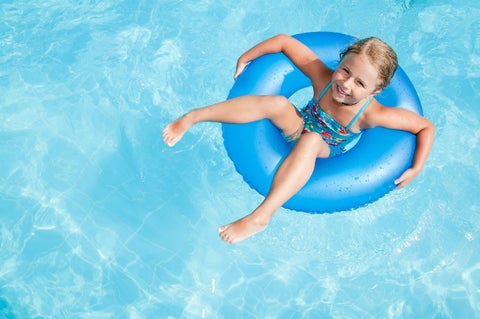Safe Summer Fun: Protect Your Kids From Environmental Hazards This Season.

This time of year, parents and kids both look forward to heading outside to (finally) enjoy the sun, balmy breezes and greenery of the season.
We all want our kids to have the freedom to run, swim and play in the great outdoors without worry. That’s why it’s our job as parents to actively protect them from common injuries and environmental hazards that occur this time of year.
“Summer can be a particularly dangerous time of year for children, who spend more time outside, and often with less supervision,” notes Allison Van Dusen in Forbes. “(But) by thinking about the worst-case scenarios and taking a few precautions, most of these types of injuries could be avoided easily.”
Here are some easy steps parents can take to keep kids safe while they play close to home this season.
-
Be savvy about the sun. A few serious sunburns can increase your child’s risk of skin cancer later in life. As such, the CDC recommends covering your child’s skin with long sleeves, long pants, hats and/or sunscreen with an SPF of at least 25. Sunscreen should be applied 30 minutes before going outside; don’t forget ears, noses, lips and the tops of feet. Sunglasses can also protect your child from having cataracts later in life.
-
Just say no to tick bites. Each year, another 300,000 people in the U.S. are diagnosed with Lyme disease spread through tick bites. For optimal tick protection the CDC recommends dressing your kids in long sleeves and long, tucked-in pants and spraying a .5 percent permethrin solution on their shoes and clothes, especially if they’ll be playing in foliage. You’ll also want to kill ticks in your yard using biodegradable Thermacell Tick Control Tubes. The small tubes developed by researchers at Harvard University School of Public Health won't harm kids or the environment, and harness nature to eliminate hundreds of potentially harmful ticks.
-
Enjoy your pool safely. Be vigilant about life jacket use and never leave kids unattended around an accessible pool, as drowning is a leading cause of death for American children ages 1 to 14. You should also keep illness-causing bacteria out of your pool by treating it chemically and keeping it free of human waste, blood or dirt.
-
Pulverize poisonous plants. Check kids’ play areas for greenery that can cause rashes, swelling and/or severe allergic reactions, and eradicate it when possible. The old adage “leaves of three, let it be” can help you identify poison ivy and poison oak, and poison sumac is another common variety.
- Err on the side of clean air. Be aware of day-to-day air pollution warnings issued by government agencies, and consider keeping children inside when pollution levels are deemed hazardous. You should also be aware children exposed to secondhand smoke are at greater risk for sudden infant death syndrome, acute respiratory infections, middle ear disease, more severe asthma, respiratory symptoms and slowed lung growth.
